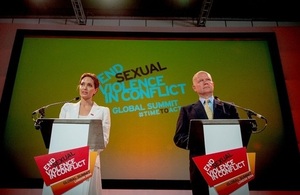High Commissioner on Global Summit to end Sexual Violence
The UK continues to encourage and call on Sri Lanka to endorse the Declaration to End Sexual Violence in Conflict.

The Global Summit to End Sexual Violence in Conflict took place in London from 10-13 June 2014.
In Sri Lanka, as elsewhere, there is a need to ensure that there is no impunity for acts of sexual violence in conflict. And there is a need to provide support and protection to survivors of sexual violence, including children as well as women and men. The Global Summit to End Sexual Violence in Conflict took place in London from 10-13 June, hosted by British Foreign Secretary William Hague and UN Special Envoy Angelina Jolie. It was attended by 128 countries, 79 Ministers and 8 UN Agency Heads, as well as by Presidents and prosecutors from the International Criminal Court and international tribunals. There were more than 300 delegates from conflict affected countries, including Sri Lanka.
The Summit was held because of the need to break the taboo around wartime rape and the culture of impunity that surrounds it. The fundamental issue is one of justice, for women and all victims subjected to such crimes. Each time these crimes happen and the world does nothing a precedent is set that sexual violence can be committed with impunity. The Summit focused on concrete, practical steps that can be taken to end sexual violence, and the role that not just Governments but also women’s groups, civil society and faith communities can play in addressing the problem.
The London Summit had two primary objectives: to agree practical action to tackle impunity for the use of rape as a weapon of war, and to begin to change global attitudes to these crimes.
States and delegates at the Summit joined together to sign a [Statement of Action] (https://www.gov.uk/government/uploads/system/uploads/attachment_data/file/319958/Global_Summit_to_End_Sexual_Violence_Statement_of_Action__1_.pdf), uniting Governments, UN Agencies, civil society, experts and survivors in a shared determination to tackle these issues. The Summit also launched the first ever [International Protocol on the Documentation and Investigation of Sexual Violence in Conflict] (https://www.gov.uk/government/uploads/system/uploads/attachment_data/file/319054/PSVI_protocol_web.pdf), setting out international standards on how to collect the strongest possible information and evidence, while protecting witnesses in order to overcome barriers to prosecution and deter future perpetrators.
Looking forward, delegates agreed on the need for security and justice sector reforms, including effective training for the military, ensuring they address sexual violence in their doctrine and policies. The importance of active participation of women in the security and justice sectors was also identified, including in post-conflict situations.
And there was agreement on the need to support survivors –women, men, girls and boys. Survivors need to be at the centre of the response to sexual violence in conflict to ensure re-empowerment and to avoid future victimisation. Governments also need to ensure that survivors receive psycho-social support, livelihood support and shelter, and reparations for victims should be accessible and prompt. The UK announced £6 million in new funding to support survivors of rape, and the United States, Australia, Finland, United Arab Emirates, Japan, Bahrain and the others also made generous pledges to support survivors.
The Declaration of Commitment to End Sexual Violence in Conflict has now been endorsed by more than three quarters of all the world’s nations – 155 countries. These include countries such as Burma, Nigeria and Cambodia, which have suffered long conflicts, and whose Governments are now determined to take action on sexual violence. By taking effective domestic action in line with international standards, all states can contribute to ensuring that the problem of sexual violence in conflict is tackled.
We encourage the Government of Sri Lanka to engage on this issue, and we will welcome it if Sri Lanka joins all those other countries who are now determined to take action to end sexual violence in conflict.